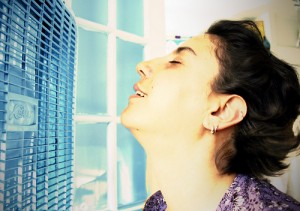Seniors, Be Aware Of Heat Stroke This Summer
 Heat exhaustion and heat stroke are the most serious heat-related illnesses.
Heat exhaustion and heat stroke are the most serious heat-related illnesses.
Extreme summer heat like we’re seeing this summer can place older people at increased risk for developing a dangerously high body temperature condition known as hyperthermia. This can result in a number of related health problems, including heat fatigue and exhaustion, sudden dizziness, heat cramps, and heat stroke (when body temperature rises above 104 degrees).
Experts advise that elderly individuals — especially those coping with chronic heart, lung and/or kidney diseases, as well as sweat gland problems and poor circulation — should stay indoors on very hot and humid days, as well as on those occasions when pollution advisories are in effect. If you do not have air conditioning, you should try to take advantage of cooler locales, such as senior centers, malls, movie theaters, churches and religious facilities, social service organizations, and libraries, and drink plenty of fluids, but avoid caffeine and alcohol.
Heat exhaustion is characterized by muscle cramps, fatigue, headache, nausea or vomiting, and dizziness or fainting. The skin is often cool and moist, indicating that the body’s mechanism for cooling itself (i.e., sweating) is still functioning. If untreated, heat exhaustion can progress to heatstroke. Heatstroke is a serious, life-threatening condition characterized by a high body temperature ( more than 103 degrees), red, hot, and dry skin (no sweating), rapid, strong pulse, throbbing headache, dizziness, nausea, confusion, and unconsciousness.
Symptoms can progress to encephalopathy (swelling of the brain), liver and kidney failure, bleeding disorders, and multiple organ system dysfunctions. This is a life-threatening condition. Prompt treatment of heat-related illnesses with aggressive fluid replacement and cooling of core body temperature is critical to reducing morbidity and mortality.
If heat stoke is suspected call 911. Anyone thought to be suffering from a heat-related condition should be brought to a shaded or air-conditioned location, and encouraged to lie down and cool off by using a sponge and cool water, or a shower or bath, if possible. Those in need can be helped by applying a cold wet cloth to those body parts where the blood circulates close to the skin surface, such as the wrist, neck, armpit and groin areas. This can be a fatal condition so it’s best to be informed and prepared given the hot temperatures throughout the country this spring.
How To Prevent Heat Exhaustion
When the heat index is high, it’s best to stay in an air-conditioned environment. If you must go outdoors, you can prevent heat exhaustion by taking these steps:
- Wear lightweight, light-colored, loose-fitting clothing, and a wide-brimmed hat.
- Use a sunscreen with a sun protection factor (SPF) of 30 or more.
- Drink extra fluids to prevent dehydration. Because heat-related illness also can result from salt depletion, it may be advisable to substitute an electrolyte-rich sports drink for water during periods of extreme heat and humidity.
- Take additional precautions when exercising or working outdoors. The general recommendation is to drink 24 ounces of fluid two hours before exercise, and consider adding another eight ounces of water or sports drink right before exercise. During exercise, you should consume another 8 ounces of water every 20 minutes even if you don’t feel thirsty.
- Avoid fluids containing either caffeine or alcohol, because both substances can make you lose more fluids and worsen heat exhaustion. Caution: If you have epilepsy or heart, kidney, or liver disease; are on fluid-restricted diets; or have a problem with fluid retention, check with your doctor before increasing liquid intake.
As always, check with your doctor to see if your health conditions and medications are likely to affect your ability to cope with extreme heat and humidity. This can be a life-threatening situation, so be prepared for the summer’s heat.
References:
- http://firstaid.webmd.com/heat-exhaustion?page=2
- http://www.usatoday.com/news/health/2010-07-31-elderly-hyperthermia_N.htm?csp=usat.me
Jeff Kreisberg is a patient advocate, educator, scientist author of the book “Taking Control of Your Healthcare,” and, until his retirement, a professor at the University of Texas Health Science Center in San Antonio, Texas. Jeff also blogs regularly on health issues on his website, Taking Control of Your Healthcare. Follow him on Twitter: @kreisberg
[Photo By Caitlinator]
